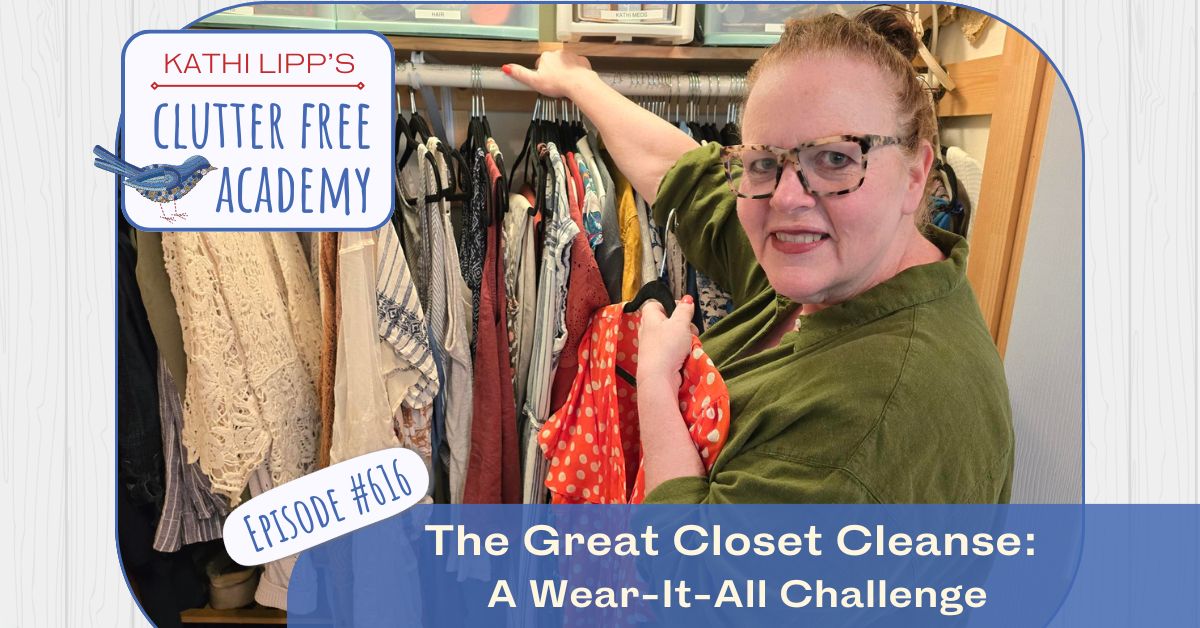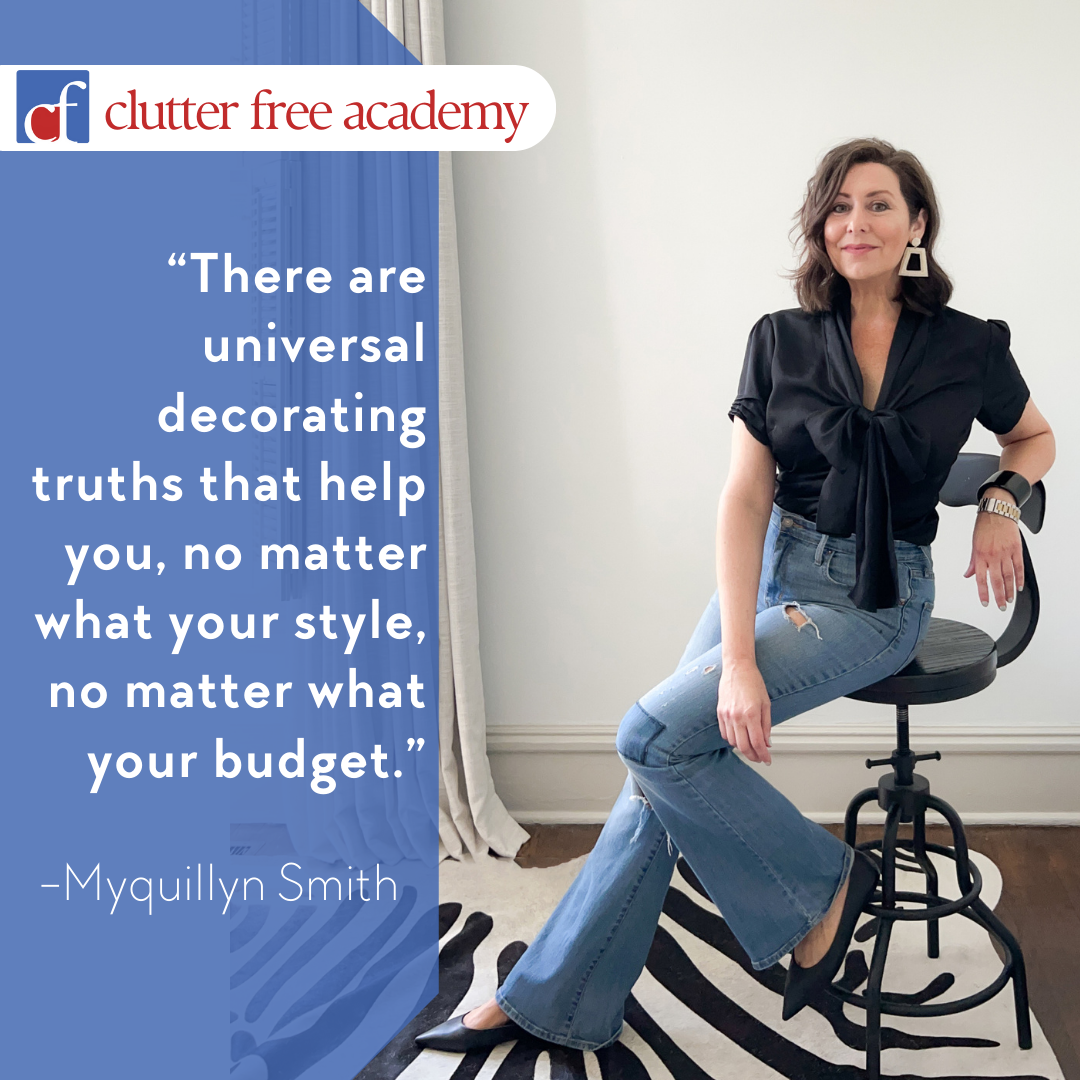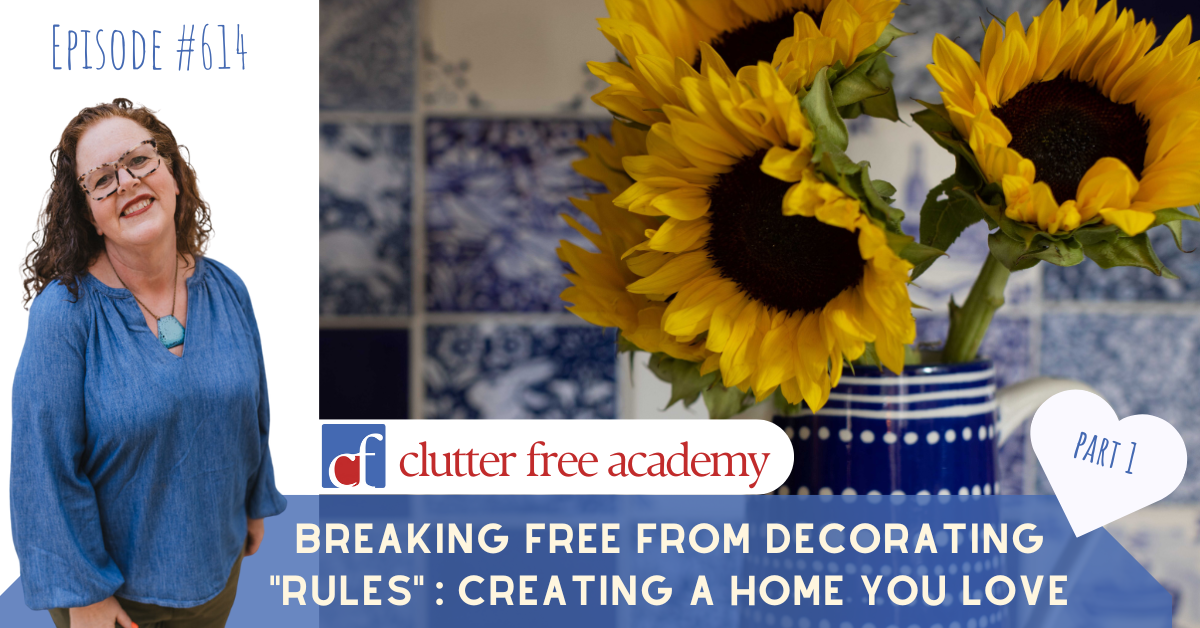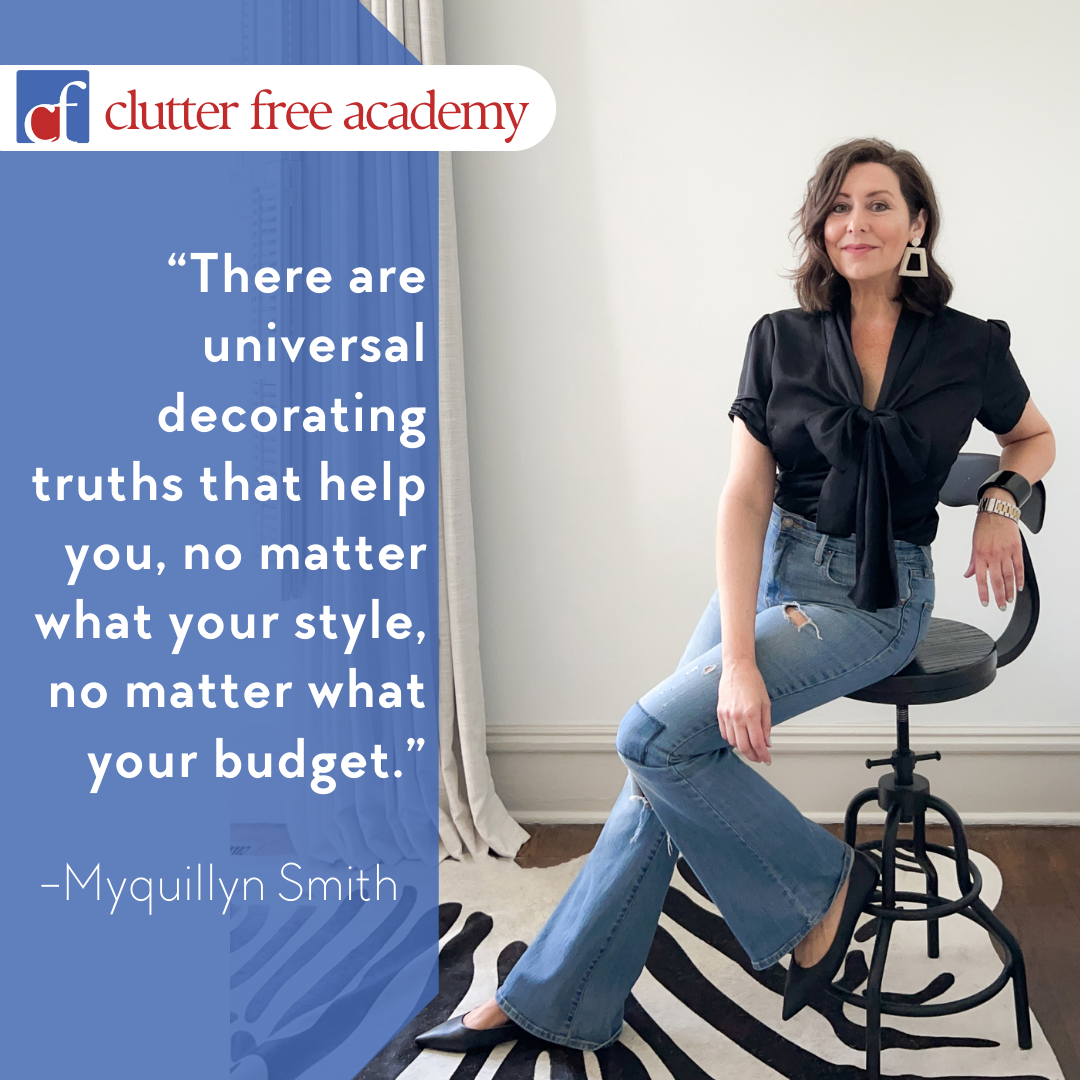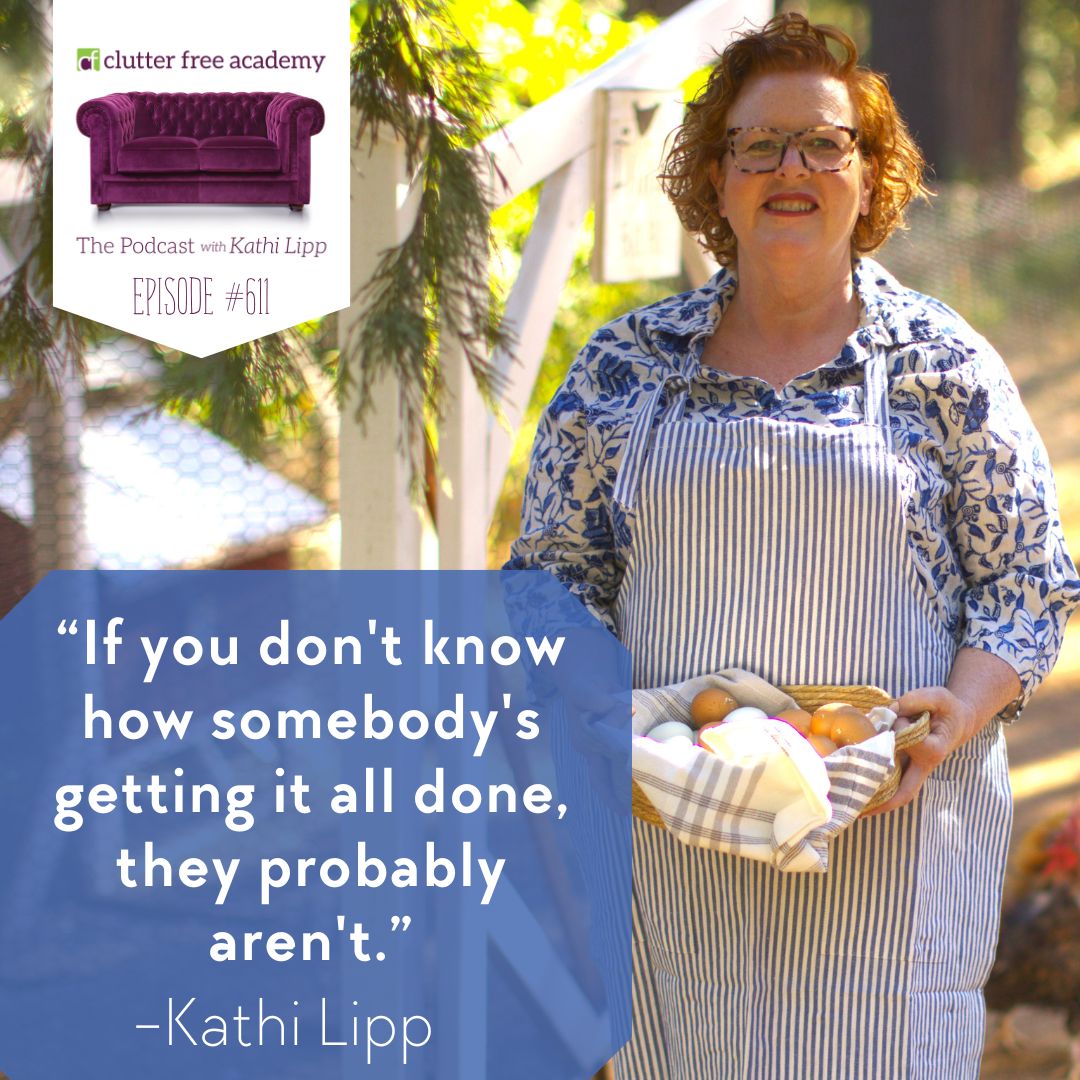Hey there, friend! In this episode of Clutter-Free Academy, Kathi Lipp and Tonya Kubo help listeners kick off 2025 with a practical plan for a clutter-free home. Kathi shares her personal goal of decluttering 100 spaces in her house this year and how she’s breaking it...

#616 The Great Closet Cleanse: A Wear-It-All Challenge
Hey there friends! Have you ever found yourself staring into an overflowing closet, feeling overwhelmed by the sheer amount of clothes you’ve accumulated? This is the episode for you! We’re so excited to share this conversation with the amazing Lauren Horst. Lauren has taken on the ultimate closet cleanse – wearing every single item she owns to assess what pieces spark joy and which ones need to go. It’s a practical, eye-opening approach that just might be the closet cure we’ve all been looking for. Listen in as we discuss:
- How to come to your closet with curiosity
- How to curate what’s best in your closet
- How to clean out your closet by wearing everything you own
So grab a cozy seat and get ready to be inspired as we dive into Lauren’s wear-it-all journey!
Follow Lauren Horst on Tik Tok.
Sign up here to receive Kathi’s free Clutter Free Kit resource.
Would you like to receive Kathi’s Clutter Free Academy newsletter in your inbox? Sign up here.

The Clutter-Free Home: Making Room for Your Life
When it comes to your home, peace is possible…
Longing for a place of peace from which you can love others well? The Clutter-Free Home is your room-by-room guide to decluttering, reclaiming, and celebrating every space of your home.
Let author Kathi Lipp (who once lived a life buried in clutter) walk you through each room of your house to create organizational zones that are not only functional and practical but create places of peace that reflect your personality. Kathi will help you tackle the four-step process of dedicate, decide, declutter and “do-your-thing” to reveal the home you’ve always dreamed of, and then transform it into a haven that reflects who you truly are meant to be.
If you’re also feeling overwhelmed by the care and upkeep of all the stuff under your feet or sense that your home is running you, instead of the other way around, come discover how to create a space that doesn’t have to be showroom perfect to be perfect for you and the people you love.
Order your copy here!
Favorite Links:
Clutter Free Resources:
Learn more about Clutter Free for Life
Are you inspired to take on this “Wear Everything You Own” challenge? What are you hoping to discover?
Share your answer in the comments.
Let’s stay connected
To share your thoughts:
- Leave a note in the comment section below.
- Leave an honest review on iTunes. Your ratings and reviews really help and I read each one.
Subscribe on iTunes or subscribe to our newsletter now.
Meet Our Guest
Lauren Horst
Lauren makes casual and relatable TikToks, encouraging others to declutter and simplify their life while also maintaining a sense of style!
Find her on Tik Tok at Lauren Horst.
Transcript
Kathi (00:00)
Well, hey friends, welcome to Clutter Free Academy where our goal is to help you take small doable steps to live every day with less clutter and more life.
And I have been very, very excited about this interview for a while now. I want to introduce you guys to Lauren Horst. Now, we just found out that I thought we just knew each other. She recognized the podcast. She’s listened to the podcast before. But turns out she was one of the interns at my church where my kids were in the high school group. So we’re like…
old friends, Lauren, and we didn’t even realize it.
Lauren (00:42)
Totally. San Jose, as big as it is, is such a small world.
Kathi (00:46)
It really is, isn’t it? It’s just crazy. Now, here’s the thing. I am so excited about this because I came across you on TikTok. And let’s just say, TikTok’s a big place, right? And you came up in my FYP, if you guys don’t know it, that for you page. So it’s not like I was subscribed to Lauren. It was just saying, the algorithm was saying, hey, I bet you’d like Lauren.
And so I started following her and she was cleaning out her closet. Wait, you say it the same every single day. Go ahead and say it.
Lauren (01:21)
Yes, I say cleaning out my closet by wearing everything I own.
Kathi (01:25)
Yes. Every day she shows up on TikTok and she’s put together a new cute outfit. I started following her and I thought, every once in a while I get my bravery up and I go to one of these big TikTokers and I say, would you come on my podcast? Lauren’s like, I know your podcast. I’m like, okay, this is crazy. Now to find out, we were in the same building forever and ever. I was so excited about this topic because
You’re not just putting together outfits, which is what, let’s be honest, a lot of 30, 40, 50-year-olds are doing on TikTok, and I love to watch it, but you’re cleaning out your closet at the same time, right? Okay, I wanna know what inspired you, first of all, to do this challenge, and second of all, to do it on TikTok.
Lauren (02:08)
Yes, exactly.
You know, I love anything related to decluttering. I feel like it’s just a hobby. And obviously minimalism is a really big trend right now, but I just think it makes so much sense for your life, for your stress levels, for just managing your home. And so I’ve watched many, many a video where people declutter their closet, kind of go through, you know, reorganize things, get rid of things, try things on. And I feel like I’ve just taken
Kathi (02:26)
Yeah.
Lauren (02:46)
bits and pieces of wisdom from people that I’ve watched. And I’m like, you know, one piece that I really like is when you try an item of clothing on, you try it on, you wear it for, you know, three to five minutes as you’re looking in the mirror, you feel unsure about it, you’re not sure, it kind of goes into a maybe pile that ends up just in the abyss of, you know, the closet. And so for example, one piece of advice that…
Kathi (03:10)
Right.
Lauren (03:13)
I’ve taken from someone over the years is if you are unsure about a piece of clothing, you have to wear it the whole day. By the end of the day, you will know whether or not you want to keep it, you’ll know whether or not you feel great, you love it, or you’ll be like, yeah, no, this is an item that I am ready to pass along. So I feel like I’ve just taken all these little bits and pieces. And that kind of inspired me to do this closet clean out, which is really a slow and steady wins the race method.
And that has really taken months, but it’s something where, you know, at the end, I will have a much more curated wardrobe that really works for my lifestyle.
Kathi (03:52)
Okay, listeners to the podcast know that my favorite word in the whole world is curated. Because, yes, because it’s on purpose. It’s honed in and it’s on purpose. And I love this so much. Okay, why did you do it on TikTok?
Lauren (03:58)
Oh really?
Um, you know, I, well, I just love TikTok. I mean, TikTok is like the vortex where all of a sudden you’ve spent two hours, you know, searching around things and discovering all sorts of things you never knew. And I feel like TikTok is just such an easy platform. I film directly into TikTok. I don’t, I really don’t do like hardly any editing on my videos other than just a voiceover at the end. So for me, making a TikTok takes me approximately two minutes every day.
Kathi (04:13)
Me too.
Yes.
Mmm.
Lauren (04:38)
which is about all that’s doable with my life.
Kathi (04:41)
right? And did you want to do it for, I mean, I love TikTok too. Did you want to do it for accountability? Were you sharing it with some people you already knew and trying to inspire them? Like what? Because it’s, I love TikTok too, but I am not filming myself on there every day.
Lauren (05:01)
Yeah, I think accountability and the whole idea is that if you’re actually wearing all of… So most people, what is it that they say? Most people only wear 20% of their wardrobe, 80% of the time, whatever that statistic is. And so what I was finding is you wear all your favorite pieces, you do laundry, they’re back in your closet, then you wear them again. You do laundry, they’re back in your closet. And what’s happening with the rest of the clothes that are hanging there? Well…
Kathi (05:13)
Yes, exactly. Yeah.
Lauren (05:29)
If you are challenged to wear everything, you know, when it comes to choosing an item in your closet, all your favorites are in the laundry and you go to pick out a shirt and you’re not that excited about it. I mean, at what point in time will you be excited about it when it’s the only option there and you still don’t really want to wear it, then it’s probably just something that you need to declutter.
Kathi (05:51)
And I feel like this theory goes for a lot of things. Like, those frozen bags of vegetables in your freezer, if I keep passing over them, maybe it’s just time to say, you know, I wanna eat healthy, but lima beans are not the way to do it for me. I’m happy for other people, but it’s not the way to do it for me.
Lauren (06:11)
Yes, exactly.
Kathi (06:15)
Were you surprised by anything in this process of getting rid of clothes? What I’ll do is I’ll make sure that we link to your TikTok here in the notes so people can kind of see what your style is. I would say you’re pretty classic with a sparkle thrown in. Does that feel like an accurate?
Lauren (06:38)
Totally. I, you know, I’m in my mid 30s. So I love classic silhouette. I work with college students. And so I do not like to be mistaken for a college student. I want to dress accordingly. But I love color patterns, prints, sequins. I do a lot of events and so get dressed up for certain things like that. And so yeah, I definitely wear some more bold pieces. But in my everyday to day life, I would say I’m pretty classic.
Kathi (06:42)
Mm-hmm.
Yeah.
Yeah, and did you discover anything about yourself, your closet, the way you want to dress through this process?
Lauren (07:17)
You know, I think I have just really discovered some silhouettes and some cuts that just don’t necessarily work for my body type or my lifestyle. And I consider myself to be pretty frugal. I love to find a good deal on clothes. And so something that has been challenging is I’m like, well, I don’t wanna just give this away to goodwill because I spent money on it. And it was now it’s, now it seems like a waste of money.
but really being able to look at my closet and have space and not be searching for things. And every item I grab is something that I love wearing. That completely outweighs the money that I’ve wasted in the past. And now I know what I’m looking for when I’m shopping. I know the type of cut I need. I know the type of sleeve that I need. And so when I pull something out of my closet, sometimes I can immediately say like, oh yeah, I’ve had this shirt. I’ve worn this before.
Kathi (08:06)
Mmm.
Lauren (08:13)
but this is no longer gonna work for me now that I know what I’m looking for.
Kathi (08:17)
You know, I think one of the best things you can learn from all this, first of all, I feel like sometimes we have to spend money on those quote unquote mistakes to really understand our own personality. The people that we admire the way they dress, they don’t get it right the first time every time. But I will say my best frugal fashionista friends, they are really good at returning things that they’re like, this is not the vibe.
I love that, you know, sometimes we have things sitting around in our closet for years because we feel like, okay, well, I just bought this, it doesn’t work for me, but I can give it away after five years. It’s like, no, don’t let that mistake sit in your closet. That’s all it is, is a mistake. Get it into the hands of somebody who will love it. And we’re going to take a quick break. But when we come back, you have a special way of giving things away that I think others will be interested in, or who you give it away to.
And I think people will be interested in hearing that. So we’re going to take a quick break and come right back. OK, guys, we are back with Lauren Horst. And we are talking about cleaning out your closet by actually wearing everything in it. And you do get rid of things. I see you get, I don’t know if you get rid of things every day, but I would say at least every third day, you’re putting something into a pile to give away. Wouldn’t you say? Yeah.
Lauren (09:42)
Yeah, definitely. Yeah, definitely. Maybe not every single day, but I mean, pretty often, I feel like it is, it’s much easier to give away things like this slowly over time because I have time to think about it. I’m seeing things in my closet versus just, you know, a two hour closet clean out where you feel like you need to make a decision right away. So I definitely have gotten rid of a lot, which
You know, on the other hand, I’m like, man, I still have so many clothes, which goes to show you like the inner hoarder of clothing that I actually have.
Kathi (10:14)
Well, you know what? I think clothes are such a beautiful self-expression. And there’s responsible ways of building a wardrobe. And I often hear you say things like, oh, I bought this five years ago. And you wear a lot of your clothes all the time. And let’s be clear, you have to get dressed seven days a week. You’re going to church, you’re going to work.
maybe Saturdays you can kind of kick it back, but you’re getting dressed all the time. And for us to be able to do that and do it and keep it interesting for us as self-expression, you need some clothes, you need some depth in your wardrobe. Now, you give away your clothes too, so talk about that.
Lauren (11:03)
Yeah, so usually what I do is the first draft of the clothes that I’m getting rid of, I work at a university and I bring them to my office and the girls who work in my office get to go through everything first. So they get first picks of everything and I know kind of now their style. So sometimes I’ll pick something out of my closet and I’m like, oh, I know so-and-so would really love this. Turns out they do.
So it’s really fun coming to work because some days I come to work and everyone in the office is wearing like my hand-me-downs Which is such a compliment
Kathi (11:37)
That’s so awesome. Yeah, and I think so often when it comes to clothes, our quote unquote mistakes are just to pass through our hands. Like those girls in your office may have never had the opportunity to buy those clothes, whether it’s budget or they don’t shop in that store, et cetera, but you get it into their hands. And what a gift that is. And I feel like as I clean out my closet, I get more specific about
the gaps in my closet. So I know exactly what I want to complete an outfit or to bring in a new trend that’s I’m not really trendy, but there are some things I like and I want to try out. But I get very specific instead of just buying things because they look cute. Do you feel like the challenge has changed your shopping habits at all?
Lauren (12:30)
You know what it has? Because along with clearing out my closet, I’ve been also trying to implement a one in, one out. So when I’m shopping and when I see something, at this point, I’ve kind of narrowed down my closet enough that pretty much everything in it, I like for the most part. And I’m just starting to be more ruthless to just be a little bit more minimal with my clothing. But I have to outweigh, this is a really cute dress. Do I wanna get rid of one of my other dresses?
Kathi (12:38)
Yeah.
Lauren (12:58)
for this item. And a lot of times the answer is no.
Kathi (13:02)
Yeah, I think when you’ve been buying clothes for a couple of decades, you start to really know what works. I’ve just recently lost a lot of weight. Thank you, Ozepik. It’s a testament to me that so many of my clothes I don’t want to get rid of, I want to get altered. Because I’m like, yeah, no, that one has served me well.
I don’t want to get rid of it. I want to continue wearing it. I just need to do that in an altered state. I think that’s beautiful. Have you noticed that there are certain brands of clothing that fit you better, that are more for the silhouette you’re looking for, or is it still, you know, is it kind of all over the map?
Lauren (13:51)
You know, it’s a little bit all over the map. But I really like J. Crew Factory. That’s one that I really like. Madewell a lot of times has, I really like their, this is actually one of those shirts, like 100% light spun cotton. I love that fabric and that feeling. So more so rather than specific brands, because I also do like to shop off Poshmark, I like to thrift. I’m looking more now for certain fabrics.
Kathi (13:57)
Mm-hmm.
Lauren (14:21)
Um, so definitely trying to stay away from the polyester as much and just looking for fabrics that will last longer, um, especially with sweaters. And, uh, because then I know that I’ll have them, the longevity in my closet will last much longer than some of the fabrics that are a little bit cheaply made.
Kathi (14:21)
Oh.
Okay, and that’s called spun cotton, what you’re wearing right there.
Lauren (14:42)
It’s like it’s a light spun cotton and so it kind of has that gauzy cotton material. That’s just super comfy Yeah, I love like the soft super soft comfortable shirts
Kathi (14:44)
Yeah, okay. Yeah, yeah.
So I would love to hear any of your tips now that you’ve done this closet curation for thrifting. Because you can’t really say when you’re thrifting, oh, I want a coral sweater that has three buttons that is a size XL. You don’t get to do that. So how do you thrift without bringing too much into your wardrobe?
Lauren (15:19)
Um, you know, with thrifting, I’m really not looking so much for the basics to add to my closet that you can kind of find, you know, at Target or wherever else as far as you know, basic t shirt, tank top, things like that. thrifting, I’m looking more for something that’s vintage, something that’s one of the one of a kind. One of the things that I found more recently was this kind of silky material, it actually had shoulder pads that were sewn in that I cut out. And it has music notes all over it, which is perfect.
Kathi (15:24)
Mmm.
Uh-huh.
I hope… Yeah.
Lauren (15:49)
I work in music. I was like, that’s such a fun novelty item. It’s cream. So it’s still a neutral and will go with everything that I wear for work. But something like that for $5 or whatever it was, I’m like, that is a one of a kind find that really when I’m thrifting, I’m just kind of looking for some of those novelty items that are at a good price.
Kathi (16:09)
Oh, I love it. That’s such a great perspective to go in with, that you’re looking for those, you know, one of a kind of things. That you, it’s not going to be your basic jeans necessarily. You might find those there. I don’t know, jeans are just a whole other thing. It’s just a, jeans and bathing suits. And I’m going to Cabo this month and it’s like, I haven’t come to tears, but I’ve…
Lauren (16:28)
Totally.
Kathi (16:38)
thought about tears when it comes to shopping for that. So I kind of push back on capsule wardrobes. I feel like it puts a lot of pressure for your clothes to do 10 things with one item, which can be great.
I don’t know. It’s hard for me to say, oh, I’m going to embrace a capsule wardrobe. How do you feel about capsule wardrobe?
Lauren (17:10)
You know, capsule wardrobes are so popular right now. And it is just one of those things that I feel like I have not been able to get behind. It makes perfect sense that what you buy and piece together matches with everything else. So you can really mix and match. So I think it does make sense for a lot of people who are just looking for that ease and getting dressed in the morning. I think for me, I just love color and novelty and different types of outfits.
Kathi (17:18)
Mm-hmm.
Lauren (17:36)
So, you know, one day I’ll be wearing jeans, a sweater, and boots, and the next day I’ll be wearing some crazy print dress, you know, with super bright colored heels or whatever it may be. So I think because my, I don’t know, my mood or my aesthetic changes from day to day, I don’t wanna feel locked into a capsule wardrobe. I would rather have a little bit of a bigger closet with more variety because I think just getting dressed is fun, it’s an expression of who you are.
Kathi (17:51)
Yeah.
Lauren (18:05)
And a lot of times I come to work, the same girls that work in my office, I have, I have like a super bright colored tropical shirt, and they nicknamed that birds of paradise. So sometimes I’ll come to work and you know, I’ll have an outfit that gets nicknamed something and it’s just it’s just a fun expression of who you are. And so I don’t want to be locked into a capsule word.
Kathi (18:16)
Oh!
And I feel like those of us who struggle with clutter, so those are the people who are listening to this, we are creative. We are, you know, we love self-expression. And I think it’s easy for us to have too much in our wardrobe, but I also feel like having too little would be stifling to a lot of people. And I love a capsule wardrobe for a trip. Like I love being able to, you know, mix and match and do that kind of thing, but for everyday life.
Like you I want variety. Okay, if somebody is going through their own closet challenge What would be your advice to them? What do you wish you would have known on day one because now we’re almost at day 100 You’ve had a hundred days of wisdom. Tell us about
Lauren (19:13)
You know, I think there’s a feeling when you put on an outfit and you feel really confident, you love what you’re wearing. I think you go about your day differently. I think you interact with people differently. You feel different about yourself, whether you go to an office, whether you’re working from home. There’s just something that is uplifting when you’re wearing an outfit that you really love. And so I would challenge anybody.
that you can have a closet where every single thing you pick is something that you love wearing and feel confident in and Life is too short to wear that shirt where you’re pulling at it and tucking it and it just doesn’t quite fit the right and It’s too tight on the sleeves that just uncomfortable feeling where you’re like for whatever reason the color the fit the style I just don’t love what I’m wearing Just get rid of it. You will be so much happier with a closet where you love every single piece
Kathi (20:05)
It is so true. You just talked about Madewell and I bought a Madewell shirt and I couldn’t realize, I didn’t know why I was avoiding wearing it. It’s cute. It’s one of my favorite colors and so I wore it this weekend. I’m like, oh, I remember why I don’t like this shirt. It’s a belly shirt. Shirts are so short these days and I’m like, yeah, that’s…
That’s not for me. And now it’s actually going into the giveaway pile, into the, I don’t know why I put it away. Did I magically think it was gonna get longer? I don’t know. But I want to be able to approach my closet and be confident, even if half of it is in the laundry, that there’s gonna be something there that I’m gonna feel confident and love wearing. And what I love, and I was talking to our paid group today this morning.
I don’t know that you’ve ever used this word, but what I love about your approach is I feel like you come to your closet with curiosity. You are trying things on and saying, does this work for me? And then you might go switch out a pair of pants. I’ve seen you do that a couple of times. You’re trying things on and you’re trying them in different things to say, is this going to work? And I’ve seen you come home and say, yeah, nope.
That’s the last time I’m wearing this. And it’s gonna be great for somebody, it’s just not great for you, and I love that. Lauren, we’re gonna put your link to your TikTok, so other people can follow along on your journey as they are cleaning out their closets as well and curating what’s best. Thank you so much for hanging out with me today.
Lauren (21:53)
Yeah, thank you so much for having me. I love your podcast. I love how much you inspire other people to declutter different aspects of their lives, which is such a broad topic, but decluttering can benefit everyone.
Kathi (22:08)
Yes, well, and I will always hold dear that this was your first podcast interview. And by the way, you slayed. So you did such a great job. And friends, you’re the most important part of this little threesome here. We’re so glad you’re here. You’ve been listening to Clutterfree Academy. I’m Cathy Lip. Now go create the clutter free life you always wanted to live.
Lauren (22:17)
Thank you.
More Posts
#654 Declutter Your Life: 100 Spaces, 15 Minutes Each
#653 Say Goodbye to Insomnia: How Decluttering Can Reboot Your Rest
Hey there, friend! In this eye opening episode of Clutter-Free Academy, join Kathi Lipp as she speaks with Dr. Vicki Kasper to explore the powerful and surprising link between clutter and sleep. They discuss the science behind rest, how a clutter-free environment...
#652 The Clutter Free Lifestyle: 10 Habits That Actually Work
Hey there, friend! In this encouraging episode of Clutter Free Academy, hosts Kathi Lipp and Tonya Kubo reveal the top 10 habits they've developed since embracing a clutter-free lifestyle. This candid conversation offers listeners practical insights into how living...
